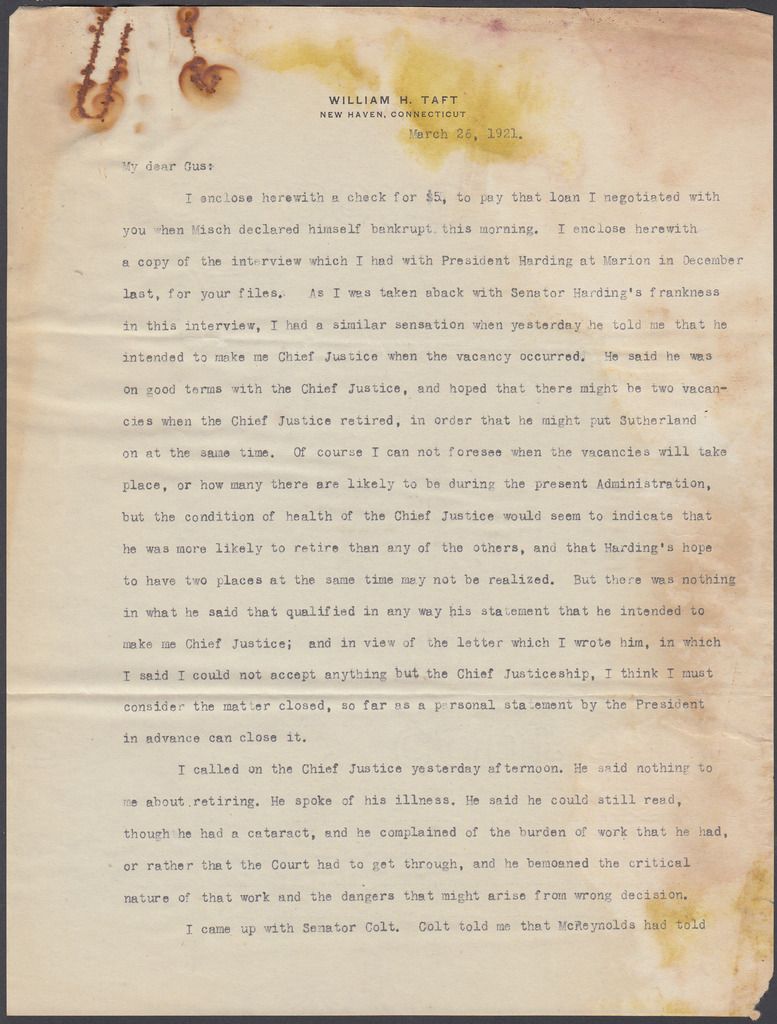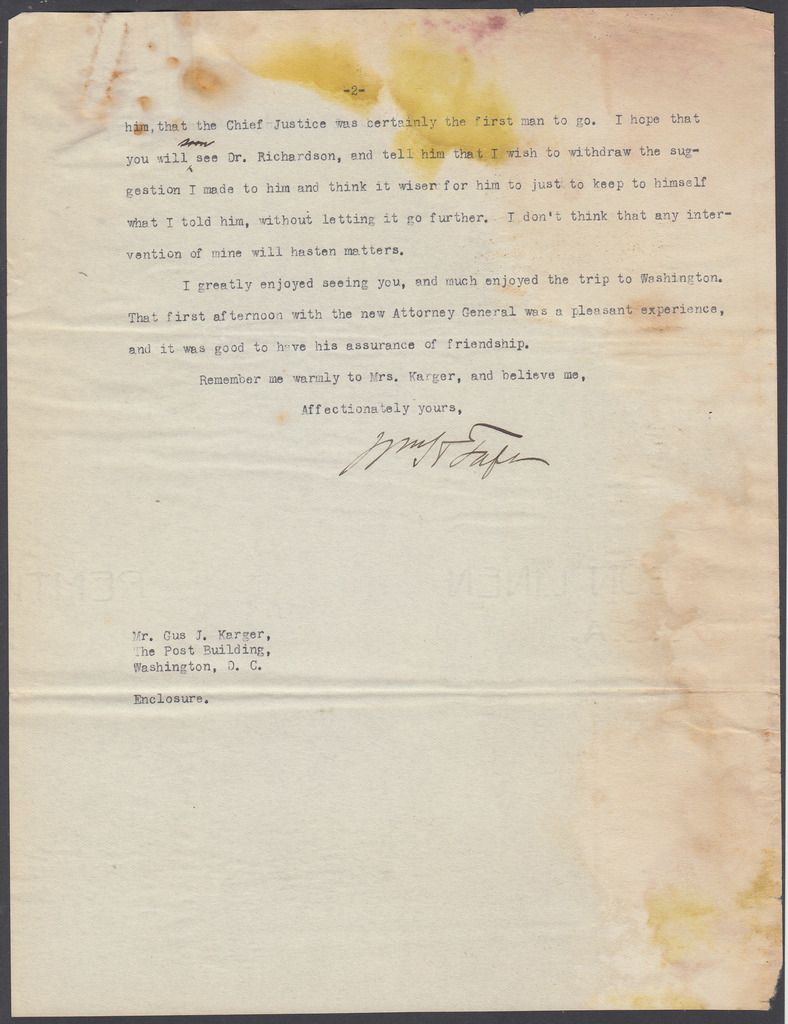I came to terms on this one last night. While Taft is not a hard autograph by any stretch of the imagination, this is a special piece. (Sorry for the all caps, it's a cut and paste from the listing)
WILLIAM H. TAFT 1921 TYPED LETTER SIGNED – INCREDIBLE CONTENT CONCERNING PRESIDENT WARREN G. HARDING & THE SUPREME COURT
** TAFT PREPARES TO BE OFFERED THE POSITION OF CHIEF JUSTICE **
27th President. Two-page typed letter signed (TLS) “Wm H. Taft”, March 26, 1921, personal stationery from New Haven, Connecticut, 8×11, to Gus Karger at the Post Building in Washington, D.C., in full:
I enclose herewith a check for $5, to pay that loan I negotiated with you when Misch declared himself bankrupt this morning. I enclose herewith a copy of the interview which I had with President Harding at Marion in December last, for your files. As I was taken aback with Senator Harding’s frankness in this interview, I had a similar sensation when yesterday he told me that he intended to make me Chief Justice when the vacancy occurred. He said he was on good terms with the Chief Justice, and he hoped that there might be two vacancies when the Chief Justice retired, in order that he might put Sutherland on at the same time. Of course I cannot foresee when the vacancies will take place, or how many there are likely to be during the present Administration, but the condition of health of the Chief Justice would seem to indicate that he was more likely to retire than any of the others, and that Harding’s hope to have two places at the same time may not be realized. But there was nothing in what he said that qualified in any way his statement that he intended to make me Chief Justice; and in view of the letter which I wrote him, in which I said I could not accept anything but the Chief Justiceship, I think I must consider the matter closed, so far as a personal statement by the President in advance can close it.
I called on the Chief Justice yesterday afternoon. He said nothing to me about retiring. He spoke of his illness. He said he could still read, though he had a cataract, and he complained of the burden of work that he had, or rather that the Court had to get through, and he bemoaned the critical nature of that work and the dangers that might arise from wrong decision.
I came up with Senator Colt. Colt told me that McReynolds had told him that the Chief Justice was certainly the first man to go. I hope that you will soon see Dr. Richardson, and tell him that I wish to withdraw the suggestion I made to him and think it wiser for him to just keep to himself what I told him, without letting it go further. I don’t think that any intervention of mine will hasten matters.
I greatly enjoyed seeing you, and much enjoyed the trip to Washington. That first afternoon with the new Attorney General was a pleasant experience, and it was good to have his assurance of friendship.
Karger was the press chief of William Howard Taft’s 1908 presidential campaign and director of the Republican Party’s press bureau in the 1912 presidential election.
This very letter has been cited and referenced in many books concerning both Taft and the Supreme Court.
The letter is not without faults as there is staining, heavy in some areas, but has a large, dark signature. Amazing content letter.
During the 1920 election campaign, Taft supported the Republican ticket, Warren G. Harding (by then a senator) and Massachusetts Governor Calvin Coolidge; they were elected. Taft was among those asked to come to the president-elect’s home in Marion, Ohio to advise him on appointments, and the two men conferred there on December 24, 1920. By Taft’s later account, after some conversation, Harding casually asked if Taft would accept appointment to the Supreme Court, for if Taft would, Harding would put him there. Taft had a condition for Harding: that having been president, and having appointed two of the present associate justices and opposed Brandeis, he could only accept the chief justiceship. Harding made no response, and Taft in a thank-you note reiterated the condition and stated that Chief Justice White had often told him he was keeping the position for Taft until a Republican held the White House. In January 1921, Taft heard through intermediaries that Harding planned to appoint him, if given the chance.
White by then was in failing health, but made no move to resign when Harding was sworn in on March 4, 1921. Taft called on the chief justice on March 25, and found White ill, but still carrying on his work and not talking of retiring. White did not retire, dying in office on May 19, 1921. Taft issued a tribute to the man he had appointed to the center seat, and waited and worried if he would be White’s successor. Despite widespread speculation Taft would be the pick, Harding made no quick announcement. Taft was lobbying for himself behind the scenes, especially with the Ohio politicians who formed Harding’s inner circle.
It later emerged that Harding had also promised former Utah senator George Sutherland a seat on the Supreme Court, and was waiting in the expectation that another place would become vacant. Harding was also considering a proposal by Justice William R. Day to crown his career by being chief justice for six months before retiring. Taft felt, when he learned of this plan, that a short-term appointment would not serve the office well, and that once confirmed by the Senate, the memory of Day would grow dim. After Harding rejected Day’s plan, Attorney General Harry Daugherty, who supported Taft’s candidacy, urged him to fill the vacancy, and he named Taft on June 30, 1921. The Senate confirmed Taft the same day, 61–4, without any committee hearings and after a brief debate in executive session. Taft drew the objections of three progressive Republicans and one southern Democrat. When he was sworn in on July 11, he became the first and to date only person to serve both as president and chief justice.

